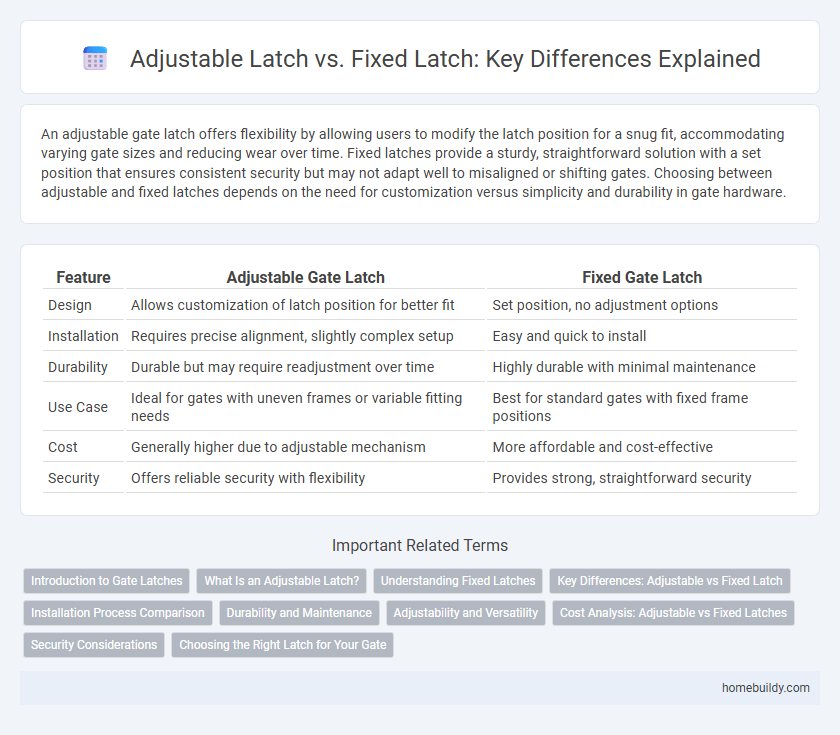An adjustable gate latch offers flexibility by allowing users to modify the latch position for a snug fit, accommodating varying gate sizes and reducing wear over time. Fixed latches provide a sturdy, straightforward solution with a set position that ensures consistent security but may not adapt well to misaligned or shifting gates. Choosing between adjustable and fixed latches depends on the need for customization versus simplicity and durability in gate hardware.
Table of Comparison
| Feature | Adjustable Gate Latch | Fixed Gate Latch |
|---|---|---|
| Design | Allows customization of latch position for better fit | Set position, no adjustment options |
| Installation | Requires precise alignment, slightly complex setup | Easy and quick to install |
| Durability | Durable but may require readjustment over time | Highly durable with minimal maintenance |
| Use Case | Ideal for gates with uneven frames or variable fitting needs | Best for standard gates with fixed frame positions |
| Cost | Generally higher due to adjustable mechanism | More affordable and cost-effective |
| Security | Offers reliable security with flexibility | Provides strong, straightforward security |
Introduction to Gate Latches
Adjustable gate latches offer customizable tension settings, allowing users to modify the latch's grip strength for various gate types and sizes, enhancing security and ease of use. Fixed latches provide a reliable, stable locking mechanism with a predetermined tension level, making them ideal for standard gates that require consistent closure force. Choosing between adjustable and fixed latches depends on the specific gate material, usage frequency, and desired level of security.
What Is an Adjustable Latch?
An adjustable gate latch allows for customizable alignment and tension to ensure a secure fit on gates of varying sizes and materials, enhancing versatility compared to fixed latches. Unlike fixed latches, which have set dimensions and cannot be modified once installed, adjustable latches feature components like sliding bolts or screw mechanisms that adapt to gate conditions. This flexibility improves gate security and ease of use by accommodating sagging or misaligned gates over time.
Understanding Fixed Latches
Fixed latches provide a secure and stable locking mechanism with a set position that does not allow adjustments, making them ideal for gates requiring consistent alignment and minimal maintenance. Their rigid design ensures durability and reliable security, especially in heavy-duty applications where movement or shifting is minimal. Understanding fixed latches is essential for selecting hardware that prioritizes long-term stability without the need for frequent repositioning or calibration.
Key Differences: Adjustable vs Fixed Latch
Adjustable gate latches offer flexibility in installation by allowing the user to modify the latch position to fit varying gate sizes and alignment needs, making them ideal for uneven or settling gates. Fixed latches have a set locking position, providing a more straightforward, often more durable option suitable for gates with consistent dimensions and minimal movement. The key difference lies in the adaptability of adjustable latches versus the rigid, stable nature of fixed latches, impacting ease of use, maintenance, and compatibility with different gate types.
Installation Process Comparison
An adjustable gate latch offers greater flexibility during installation, allowing precise alignment with various gate frames and posts without the need for exact measurements. Fixed latches require accurate, predetermined positioning, often increasing installation time and the risk of misalignment. The adjustable latch simplifies the setup process by accommodating slight variations in gate dimensions, making it ideal for uneven or custom gates.
Durability and Maintenance
Adjustable gate latches offer enhanced durability by accommodating gate movement and reducing stress on hardware, which extends the lifespan of the latch mechanism. Fixed latches, while simpler, may experience faster wear due to limited flexibility and increased strain during gate operation. Regular maintenance is easier with adjustable latches as they can be realigned without replacement, minimizing downtime and repair costs.
Adjustability and Versatility
Adjustable gate latches offer enhanced versatility by allowing users to customize the latch position for varying gate sizes and alignment needs, ensuring a secure fit even as the gate settles or shifts over time. Unlike fixed latches, which have a predetermined catch point and limited accommodation for changes, adjustable latches provide flexibility that improves functionality and longevity in diverse installation scenarios. This adjustability reduces maintenance frequency and adapts to different gate materials and designs, making it ideal for both residential and commercial applications.
Cost Analysis: Adjustable vs Fixed Latches
Adjustable gate latches typically cost more upfront due to their versatile design, allowing customization for various gate sizes and alignment issues. Fixed latches offer a more budget-friendly option with simpler installation but may require replacement or adjustment if the gate settles or warps over time. Evaluating long-term maintenance costs against initial savings is essential when choosing between adjustable and fixed latches.
Security Considerations
Adjustable gate latches offer enhanced security by allowing users to customize the fit and tension, reducing gaps that can be exploited by intruders. Fixed latches provide a consistent locking mechanism but may create vulnerabilities if the gate or latch is misaligned due to weather or settling. Choosing an adjustable latch improves resistance to forced entry and enhances overall perimeter security.
Choosing the Right Latch for Your Gate
Adjustable gate latches offer versatility by allowing users to modify the latch position to accommodate gate movement and different frame sizes, making them ideal for uneven or settling gates. Fixed latches provide a sturdy, permanent fastening solution best suited for gates with consistent alignment and minimal warping. Selecting between adjustable and fixed latches depends on gate material, expected wear, and the need for future adjustments to maintain security and ease of use.
adjustable latch vs fixed latch Infographic

 homebuildy.com
homebuildy.com